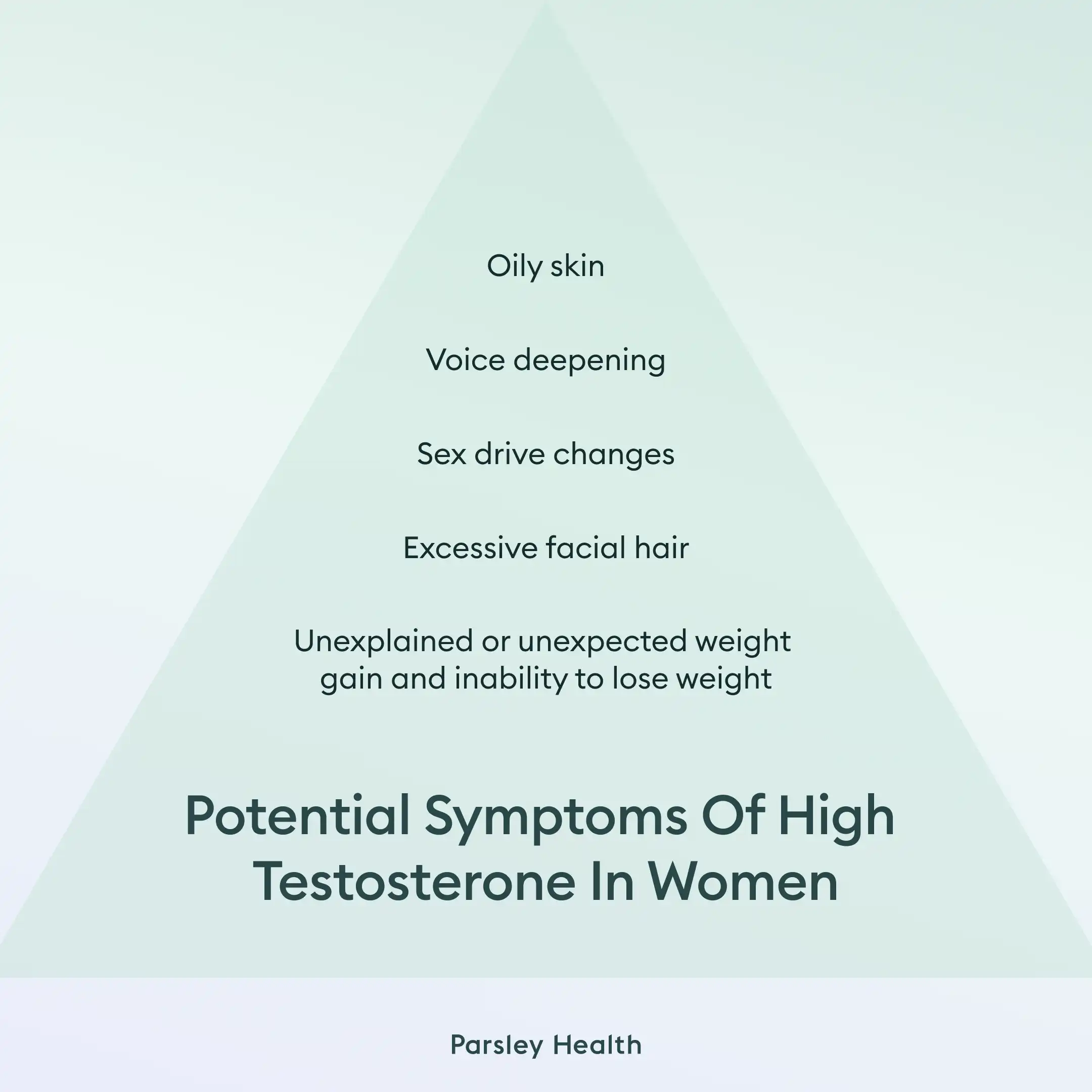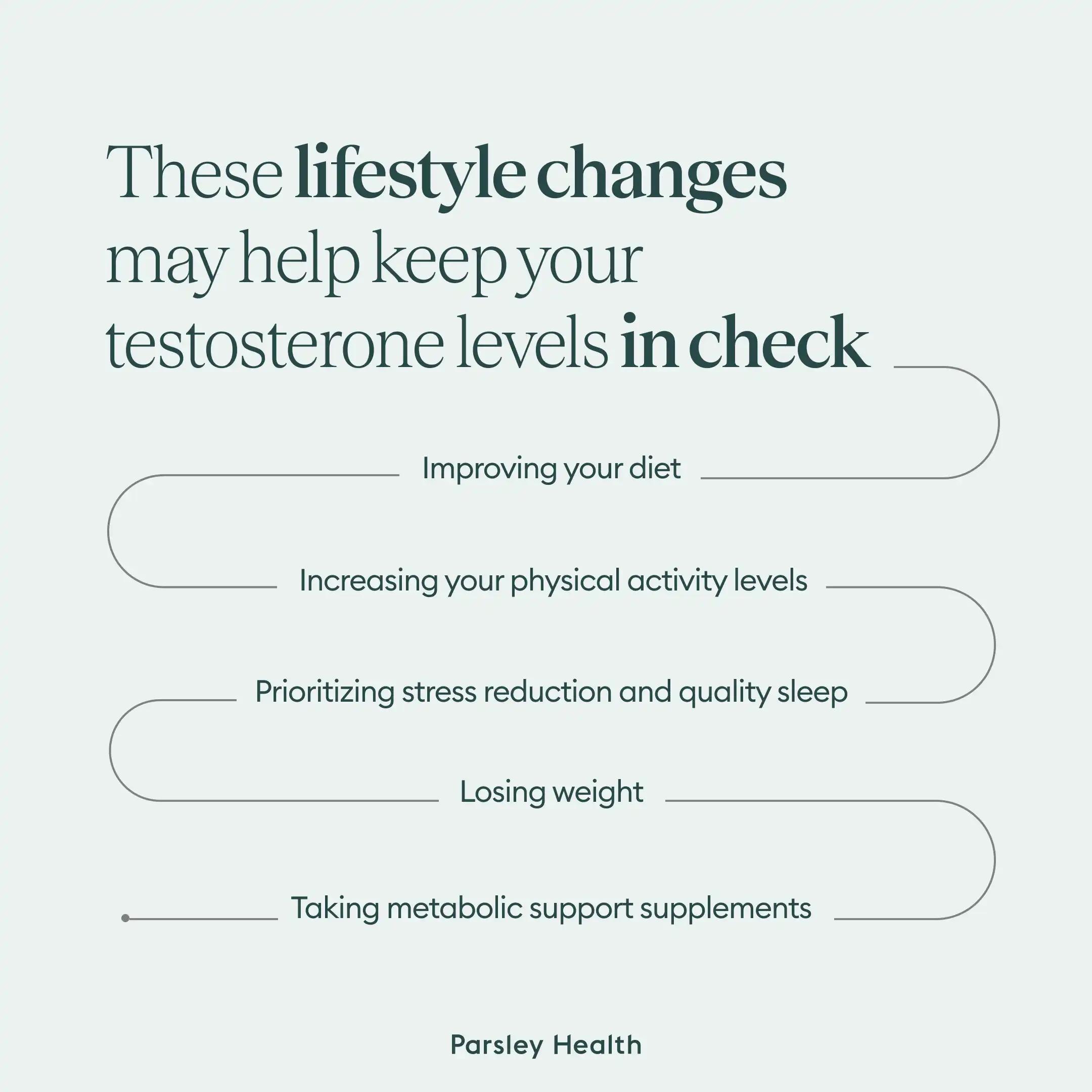Testosterone is a sex hormone that both the male and female body need. However, when testosterone is too high in the female body, it can cause issues with menstruation and fertility, lead to acne and unwanted hair growth, impact weight, and more. You can take steps to reduce your testosterone level naturally through diet and exercise changes, but in some cases, depending on the cause and your unique circumstances, medication may be needed.
Our sex hormones often get categorized into male vs. female hormones, but the truth is we all need hormones such as estrogen and testosterone, the latter often called “T” for short.
“Testosterone often gets a bad rap as the ‘man hormone,’ but women need it too,” says Shweta Patel, MD, a board-certified OB-GYN, the author of “The Book of Hormones,” and the founder of GAYA Wellness.
“It’s crucial for things like muscle mass, bone density, and even mood regulation,” she says. “Let’s not forget our libido!”
Although people assigned female at birth need testosterone, levels can sometimes creep too high, leading to a state of hyperandrogenism. Hyperandrogenism can cause symptoms, such as fertility issues, menstrual irregularities, weight changes, mood changes, acne, unwanted hair growth, and more.
For these reasons, you may be seeking info on how to lower your testosterone level naturally. In this article, we’ll explore testosterone levels and the natural methods and medical treatments that may help lower T when needed.
Understanding high testosterone in women
The female body produces testosterone (a hormone that is also called androgen) in the adrenal glands and the ovaries’ theca cells. The first thing to know about testosterone levels in the female body is that research is sorely lacking regarding how changes in testosterone levels, whether high or low, affect people assigned female at birth throughout all life stages.
What we do know is that, according to research, the female body is more sensitive to T fluctuations, yet most research on testosterone focuses on male study participants. What limited research we have on testosterone levels in the female body can be confusing and conflicting.
Total testosterone levels in the female body (reproductive age)
Testosterone deficiency: <15 ng/dL
Normal levels: 15-70 ng/dL
Hyperandrogenism (high levels): >70 ng/dL
Complicating matters is that levels of T tend to decrease during the reproductive years and into perimenopause, declining by about 50% before menopause. However, high T as a result of certain conditions can be an issue even in postmenopause.
Causes of elevated testosterone
In the female body, high testosterone can occur for several reasons, including underlying conditions.
Insulin resistance or metabolic syndrome
Insulin resistance occurs when our cells stop responding as well to insulin signaling. When you eat, and depending on what you eat, your glucose (blood sugar) level rises in your bloodstream. In response to this rise, your pancreas kicks out insulin. Insulin then tells your cells to uptake glucose to be used for energy, either immediately or stored for later—when you’re hitting the gym and murdering your quads with set after set of squats.
However, repeated spikes in blood sugar or regularly high blood sugar can lead to your pancreas having to work overtime to produce and release more insulin. Eventually, your cells say “nope” and stop responding as well to this hormone because they cannot process any more glucose. As a result, both your glucose levels and insulin levels remain high in the bloodstream. High insulin levels (hyperinsulinemia) can cause the ovaries’ theca cells to produce too much testosterone.
Insulin resistance is a major contributor or feature of metabolic syndrome (MetS). MetS is a cluster of risk factors that can lead to health issues. These risk factors include abdominal obesity, high blood pressure, impaired fasting glucose, high triglycerides, and low high-density lipoprotein (aka “good”) cholesterol. People assigned female at birth who have MetS tend to have higher testosterone levels.
Polycystic ovary syndrome
Polycystic ovary syndrome (PCOS), an endocrine disorder, is another common reason people assigned female at birth may have hyperandrogenism, and it’s one of the most common causes of infertility in birthing people.
In PCOS, sometimes the ovaries develop small fluid-filled sacs called cysts, and these cysts can produce androgens. PCOS, insulin resistance, and MetS have strong connections. Other potential symptoms of PCOS include acne, weight gain, hirsutism (unwanted hair growth such as on the face), abdominal pain, and more.
Adrenal disorders or hyperplasia
The adrenal glands (in addition to the ovaries) produce some testosterone. Some conditions that affect the adrenal glands can lead to hyperandrogenism. Congenital adrenal hyperplasia (CAH) is an umbrella term for these conditions. Symptoms will depend on the type of CAH a person has but may include menstrual irregularities, hirsutism, acne, infertility, and more.
Perimenopause and menopause
Menopause is that moment in time when you’ve had an absence of a period for 12 months. (Bye-bye, Aunt Flow.) In the years leading up to menopause, you will be in perimenopause, which is characterized by shifting hormones, including declining estrogen and testosterone.
“Sometimes estrogen declines relatively faster than testosterone, leading to relatively elevated testosterone levels,” says Neha Lalani, MD, an endocrinologist in private practice at Bluebonnet Diabetes & Endocrinology.
Ovarian tumors
Although rare, some ovarian tumors can also secret more androgens, leading to an excess of T.
Use of certain medications
Some prescription medications can also cause hyperandrogenism, including the following:
Cyclosporine is an immunosuppressive medication generally used to prevent organ rejection in people who’ve had a transplant, but it’s also prescribed for some autoimmune conditions, such as rheumatoid arthritis.
Danazol is used to treat endometriosis, a systemic inflammatory condition.
Dehydroepiandrosterone (DHEA) is sometimes prescribed to treat menopause symptoms and other conditions.
Minoxidil is used to treat thinning hair or hair loss.
Symptoms of high testosterone
The symptoms of high testosterone in females will depend on the cause. “Women with high testosterone might experience things like excessive hair growth (hello, chin hairs), acne, thinning hair on the scalp, and even voice deepening,” Dr. Patel says. “It’s like your body has mistaken itself for a teenage boy going through puberty.”
Potential symptoms of high testosterone in women:
Abdominal pain
Acne
Anxiety
Depression
Enlarged clitoris
Excessive facial or body hair growth
Hair loss or thinning
Infertility
Menstrual irregularities
Mood swings
Oily skin
Sex drive changes
Voice deepening
Unexplained or unexpected weight gain and inability to lose weight

How high testosterone affects women’s health
Hyperandrogenism can affect your health in multiple ways, including your reproductive, mental, and long-term health.
Impact on reproductive health and fertility
When the ovaries produce too much testosterone, the high level can prevent or disrupt ovulation, the release of an egg. Disrupted ovulation can lead to menstrual irregularities—such as missed, absent, or irregular cycles—and infertility.
Role in mental health
Testosterone also plays a role in mood, but we need more research into the exact effects since existing studies don’t give us a complete picture. For example, a 2021 analysis of existing research indicates that testosterone levels are significantly different in females with depression than those without. The analysis points to a difference between people who are premenopausal and those who are postmenopausal. In premenopausal participants, higher testosterone was linked to depression. In those who were postmenopausal, lower testosterone was linked with depression.
The bottom line is that changes in testosterone may lead to alterations in mental health status. “Women may experience mood changes, including increased irritability or aggression,” says Harold Hong, MD, MBA, a board-certified psychiatrist and medical director at New Waters Recovery.
Long-term health risks
Since high T in females is linked to insulin resistance, those with hyperandrogenism may be more at risk for developing conditions such as type 2 diabetes, obesity, heart disease, and more. It may also increase your risk for certain types of cancers, including breast and endometrial.
The role of gut health in hormonal balance
Your gut microbiome consists of all the bacteria and fungi that live in your gastrointestinal (GI) tract. “There is growing evidence that the gut microbiome and testosterone levels are interconnected,” Dr. Hong explained. “A healthy gut microbiome helps regulate hormone production, including testosterone, while an imbalanced gut (known as dysbiosis) can worsen issues like inflammation and insulin resistance, both of which can affect testosterone levels.”
The reverse is also true. “Hormonal fluctuations, including changes in testosterone,” he adds, “can also alter the composition of the gut microbiome, creating a two-way relationship.” Dr. Hong recommends supporting your gut microbiome with a fiber-rich diet that includes both probiotic and prebiotic foods.
Environmental factors affecting hormonal imbalance
Chemicals in our environment, personal and home care products, furniture, and the foods we eat (and their packaging) can also impact hormone levels. Some chemicals are endocrine-disruptive chemicals (EDCs) and have been linked to high T in people assigned female at birth.
These chemicals are also called “obesogens,” meaning they can drive weight gain, and they are tied to insulin resistance, which can increase your T levels. Obesogens are prevalent in ultra-processed foods.
Although we can’t completely avoid endocrine-disrupting chemicals (they’re everywhere!), we can reduce our exposure by lessening our use of plastics and by buying personal care, cleaning, and other home products that the Environmental Working Group (EWG) recognizes as safe.
Endocrine disruptors
Atrazine
Bisphenol A (BPA)
Dioxins
Perchlorate
Per- and polyfluoroalkyl substances (PFAS)
Phthalates
Phytoestrogens
Polybrominated diphenyl ethers (PBDE)
Polychlorinated biphenyls (PCBs)
Triclosan
Obesogens in food
Fructose (and high-fructose corn syrup)
Trans fats
Xenobiotics (contaminants, industrial chemicals, pesticides, environmental pollutants)
Natural ways to lower testosterone levels
Some natural lifestyle changes may help keep your testosterone levels in check. These include revamping diet, boosting activity levels, prioritizing sleep and stress reduction, and losing weight if needed.
Make changes to your diet
“If insulin resistance is the culprit behind high testosterone, it’s time to get serious about lifestyle changes,” Dr. Patel says. “First off, balanced diets that don’t spike insulin—think whole foods, fiber, and healthy fats—are your best friends.”
You can keep insulin in check by keeping glucose levels in check. “Combining high fiber foods with protein and fat is a great way to keep blood sugar levels more stable, which can help to lower insulin resistance over time,” says Alyssa Pacheco, a registered dietitian specializing in PCOS.
Eliminate as much as possible ultra-processed foods, refined carbohydrates, and added sugar—all of which tend to spike glucose and therefore insulin.
Up your physical activity levels
Consider a mix of cardio exercises, such as running, swimming, rowing, cycling, hiking, etc., to get in your 150 minutes of moderate intensity exercise per week. Also, don’t forget to build that muscle. Muscle acts like a sponge to help soak up glucose from the bloodstream, which can help keep your insulin level down.
Consider getting in at least two strength-training sessions per week. You don’t have to pump iron at the gym unless you want to. Bodyweight exercises (like push-ups and squats) help, as do free weights, which you can use anywhere, including in the comfort of your own home while slaying your Netflix queue.
Prioritize stress reduction and quality sleep
A lack of good quality sleep and too much stress can also impact your hormones, including your T levels. Aim for at least seven hours of uninterrupted sleep per night and find ways to manage your stress levels. (Yep, easier said than done.) Activities like yoga, meditation, spending time with loved ones, and more are all great places to start.
Losing weight
Some of the interventions mentioned above may also help spur fat loss, which can be of benefit. “A natural way to decrease excess testosterone in women, especially because of PCOS, is losing 5 to 10 percent of body weight,” Dr. Lalani says. However, not everyone with PCOS has obesity or overweight. Even people who are relatively lean can have this frustrating condition.
Taking supplements that support metabolic health
Some supplements may also help by counteracting insulin resistance, if that’s the cause of your high T. When starting a new supplement, consulting a knowledgeable clinician is always a good idea.
Berberine is a compound in some plants, such as barberry goldenseal Oregon grape, and more. It’s been shown to have a modest effect in managing blood sugar levels and may help manage PCOS.
Bitter melon, also called bitter gourd, is another supplement that’s been shown to help modestly regulate blood sugar and boost insulin sensitivity.
Anti-Spike Formula is a combination of several ingredients proven to help reduce blood sugar spikes after meals and boost insulin sensitivity.
Cinnamon is a spice that has modest blood sugar-lowering effects and serves as a great flavoring substitute for sugar in coffee, tea, and foods.
Apple cider vinegar can be used as a beverage, diluted in water, before a meal to help blunt a blood sugar spike.
Medical treatments for high testosterone
Depending on the reason for your high testosterone levels, you may need medical treatments as well as lifestyle changes. Some medical options include the following:
Blood sugar-lowering medications. Blood sugar-lowering medications, such as metformin, help increase insulin sensitivity, which can help mitigate how much testosterone the ovaries produce.
Statins. Statins are generally prescribed to help lower cholesterol, but atorvastatin has been shown to help reduce T in women with PCOS.
Weight loss medications. Glucagon-like peptide-1 receptor agonists (GLP-1 RAs) are generally used to treat type 2 diabetes and obesity. However, for people with PCOS, they may help counteract insulin resistance and therefore reduce testosterone levels.
Bariatric surgery. For people with PCOS who also have obesity, bariatric surgery may help alleviate insulin resistance and weight gain, which may then help lower T.

When to see a doctor
If you are experiencing symptoms of high testosterone, consider talking to a knowledgeable clinician who can test your T levels, help you uncover the reasons why you have high T, and tailor a treatment plan to your unique needs.
Signs that you should talk to a healthcare professional include experiencing menstrual irregularities or fertility issues or noticing an impact on your quality of life from issues like hirsutism, acne, obesity, mood changes, and more. You don’t have to simply accept these symptoms as a fact of life.
Key takeaways
High testosterone in people assigned female at birth is often a result of conditions like insulin resistance and PCOS.
For females, high T can lead to issues with menstruation and fertility, acne unwanted hair growth, and other symptoms.
Natural ways to lower T often include boosting insulin sensitivity through lifestyle changes. However, some conditions or situations may require medication or other interventions.
If you are concerned you have high T, reach out to Parsley Health for a free consultation.
FAQ
How can a woman reduce testosterone levels?
Eating for more stable blood sugar, getting adequate physical activity, and prioritizing quality sleep and stress reduction can help you lower your testosterone levels naturally. However, in some cases, medications may be necessary.
What happens if testosterone is high in females?
If your testosterone level is too high, you may experience menstrual irregularities, infertility, acne, unwanted hair growth (such as on the face), hair loss, weight gain, and more.
Which foods decrease testosterone?
Foods don’t directly lower testosterone. However, by prioritizing foods that don’t spike your blood sugar—such as fruits, veggies, healthy fats, lean protein, and more—you may be able to reduce your testosterone level by increasing your insulin sensitivity.


